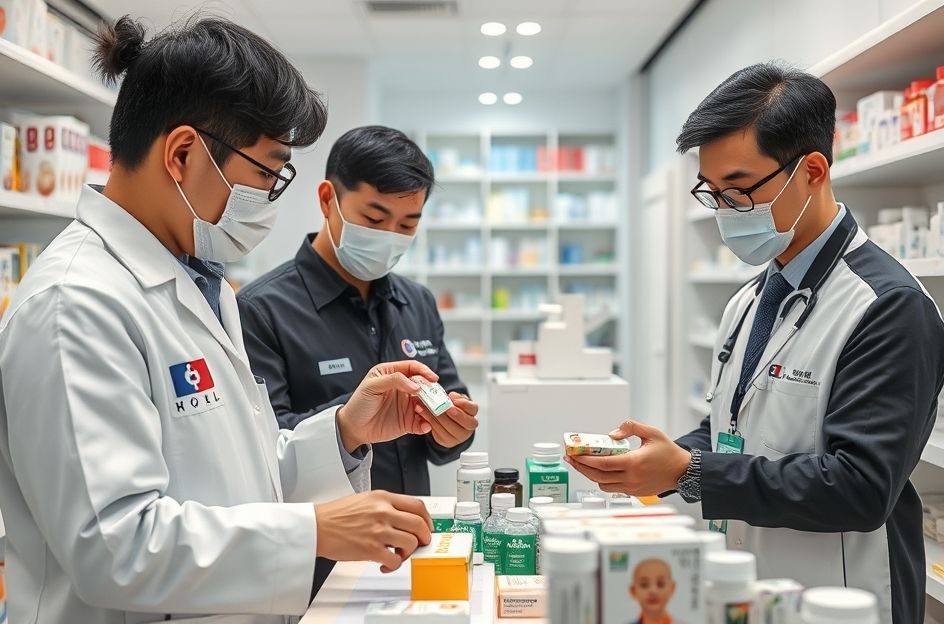Korea's Food and Drug Safety Ministry (MFDS), led by Minister Oh Yu-kyung, has announced a comprehensive five-day inspection campaign targeting pharmaceutical advertising violations across the nation from September 8-12, 2025. This proactive measure comes ahead of Chuseok, Korea's most significant traditional holiday, when demand for health-related products typically surges as families gather to celebrate and exchange gifts.

For American readers unfamiliar with Korean culture, Chuseok is Korea's equivalent to Thanksgiving, a three-day holiday when millions of Koreans travel to their ancestral homes for family reunions. During this period, health supplements and pharmaceutical products become popular gifts, similar to how Americans might give wellness products during the holiday season.
Comprehensive Regulatory Approach to Holiday Health Marketing
The inspection campaign represents a significant regulatory effort involving 17 local government agencies working in coordination with the central MFDS authority. This multi-tiered approach reflects Korea's highly centralized healthcare regulatory system, which differs from the more decentralized state-by-state regulation common in the United States. Korean pharmaceutical regulation operates under strict government oversight, with the MFDS functioning similarly to the FDA but with more direct control over local enforcement.
The inspections will target three primary areas: prescription drug advertising in hospitals and clinics, over-the-counter medication labeling in pharmacies, and online marketing of quasi-pharmaceutical products. This comprehensive scope addresses the increasing digitization of healthcare marketing in Korea, where online pharmaceutical sales have grown exponentially, reaching approximately $2.8 billion (3.7 trillion won) in 2024.
The timing is particularly strategic, as Korean families traditionally purchase health supplements and wellness products as Chuseok gifts for elderly relatives. This cultural practice, known as "filial piety gifts," creates a seasonal spike in pharmaceutical product demand that unscrupulous marketers often exploit through misleading advertisements.
Advanced AI-Powered Enforcement System
Central to Korea's pharmaceutical enforcement strategy is the deployment of the "AI COPS" (Comprehensive Online Pharmaceutical Surveillance) system, an artificial intelligence platform that monitors online pharmaceutical marketing in real-time. This technology-forward approach represents a significant advancement over traditional regulatory methods used in Western countries.
For American readers, Korea's AI-driven regulatory approach contrasts sharply with the more traditional inspection methods typically employed by U.S. state pharmacy boards and the FDA. The Korean system can process thousands of online advertisements simultaneously, identifying potential violations through natural language processing and image recognition algorithms.
The AI system specifically targets several types of violations that are culturally significant in Korean healthcare marketing: exaggerated claims about traditional medicine integration, misleading statements about product origins, and unauthorized health benefit assertions. These issues are particularly relevant in Korea, where traditional and modern medicine coexist in ways that don't typically occur in American healthcare systems.
Broader Healthcare Policy Context
This inspection campaign is part of Korea's comprehensive "2025 Major Policy Implementation Plan," which envisions creating "a world where pharmaceutical safety becomes part of daily life." This ambitious vision reflects Korea's commitment to achieving healthcare standards comparable to those in developed Western nations while maintaining its unique healthcare delivery characteristics.
The policy framework includes several initiatives that would be familiar to American healthcare observers: enhanced monitoring of high-risk medications like obesity treatments, strengthened controlled substance management through big data analytics, and improved pharmaceutical supply chain transparency. However, Korea's approach is notably more centralized and technology-intensive than typical U.S. regulatory strategies.
Particularly significant is Korea's pharmaceutical supply chain management reform, which requires manufacturers and importers to provide 180-day advance notice of supply disruptions, compared to the 30-day standard common in many Western countries. This extended notification period reflects lessons learned during the COVID-19 pandemic, when Korea experienced critical shortages of certain medications despite its advanced manufacturing capabilities.
The international cooperation component of Korea's strategy includes regulatory training programs aligned with U.S. and European Union standards, and multilateral pharmaceutical regulatory cooperation with Japan, Taiwan, and Singapore. By 2027, Korea plans to implement AI-powered quality reviews for pharmaceutical raw materials, potentially making it one of the first countries to fully integrate artificial intelligence into pharmaceutical approval processes.
Healthcare System Modernization Efforts
Concurrent with these regulatory initiatives, Korea's healthcare system is undergoing significant modernization. The recent establishment of medical accident compensation review committees following increased compensation limits represents a move toward more patient-centered healthcare, similar to medical malpractice reform efforts in various U.S. states.
The upcoming influenza vaccination program, beginning September 22, demonstrates Korea's proactive public health approach. The transition to trivalent vaccines reflects Korea's ability to rapidly adapt to global epidemiological changes, specifically the long-term absence of Type B Yamagata virus strains worldwide. This agility in public health response contrasts favorably with slower adaptation patterns sometimes seen in larger, more decentralized healthcare systems.
Legislative efforts to establish legal standards for healthcare staffing ratios, including nurse-to-patient ratios, align with similar initiatives in states like California. These measures, originally part of President Lee Jae-myung's campaign promises and the September 2nd labor agreement, could significantly impact healthcare quality and accessibility across Korea's universal healthcare system.
The Korean approach to healthcare regulation demonstrates a unique blend of technological innovation, centralized coordination, and cultural sensitivity that offers interesting parallels and contrasts to American healthcare governance. As Korea continues to evolve its regulatory framework, international observers are watching closely to see how these innovations might inform global best practices.
An MFDS spokesperson emphasized that "this intensive inspection will help us prepare for increased pharmaceutical demand during the holiday period and ensure that consumers can make safe, well-informed medication choices based on accurate information. We will continue to strengthen preventive inspections and post-market surveillance for pharmaceutical safety management."
Related Article: 식약처, 추석 앞두고 의약품 표시·광고 위반 집중점검 실시


0 Comments